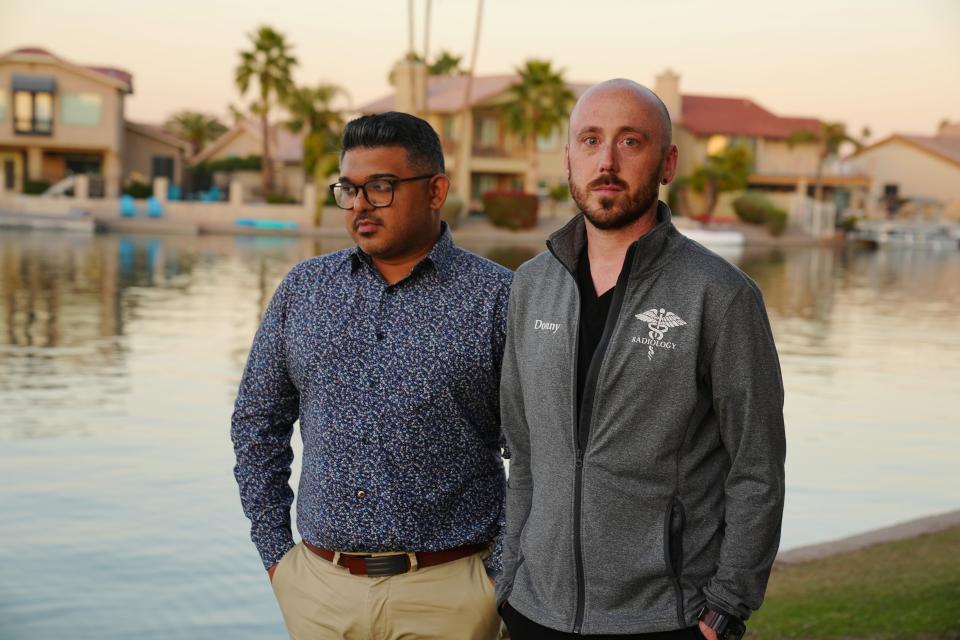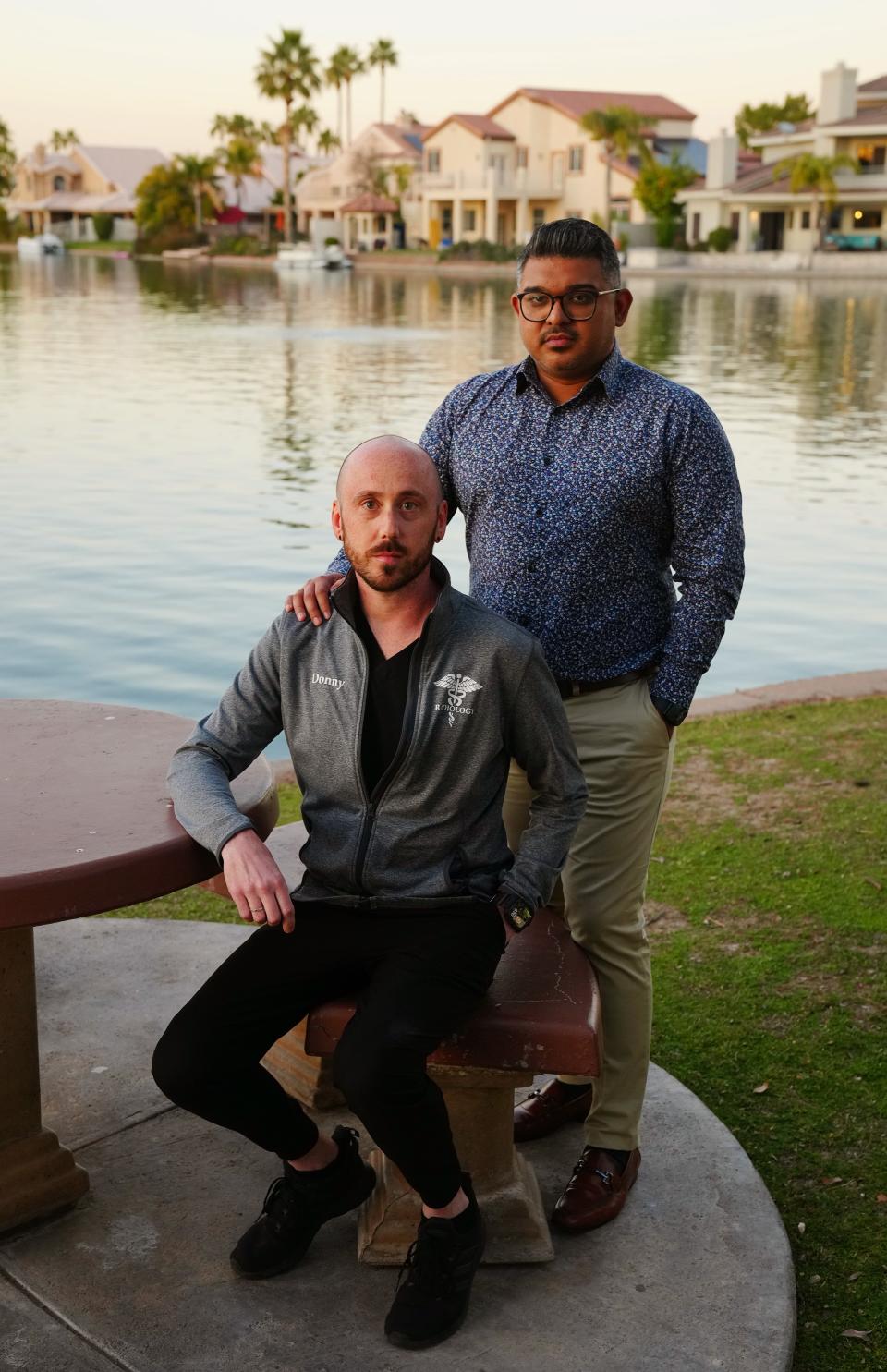'I felt very unsafe': Gay fathers confronted at Arizona religious school accepting vouchers

Don Williams and his husband, Jose Ortega, were told by the pastor of a religious school in Arizona where Williams' daughter is a student that gay couples are not welcome on campus, the couple said.
"He made it clear to us that people bring their kids to him to stay away from people like us," Ortega said.
The confrontation at Heart Cry Christian Academy shows how, as publicly funded education vouchers blur the lines between public and private education, anti-discrimination provisions that protect families enrolled in district and charter schools may not apply.
A spokesperson for the Arizona Department of Education, which issues the vouchers that can be used at private schools, said a scenario like the one Williams and Ortega experienced is a matter for the courts and that the agency won't step in. But experts said there are limited legal avenues when it comes to religious schools and discrimination.
It’s unclear whether Williams' daughter uses a voucher to pay tuition at Heart Cry, although Heart Cry advertises on its website that it will accept public money from Arizona's voucher program.
Even if the school accepts vouchers, nondiscrimination law doesn't apply to students enrolled in parochial schools, according to Scottsdale-based education lawyers Lori Kirsch-Goodwin and Hope Kirsch.
Arizona law regarding the voucher program makes clear that a private school "shall not be required to alter its creed, practices, admissions policy or curriculum in order to accept students whose parents pay tuition or fees" using a voucher. Data from the state's Education Department, which oversees the voucher program, shows that most schools that receive voucher funds are religiously affiliated. When a parent takes Empowerment Scholarship Account funds, as Arizona's school vouchers are called, the money is deposited into an account that can be drawn upon "for a wide variety of educational expenses," according to the Arizona Department of Education. The funds, for instance, can be used for private school tuition at a private school, tutoring, therapy or educational materials.
"Once you take the ESA money, you're losing a lot of your protections," including federal protections under the Individuals with Disabilities Education Act, Kirsch said. "You don't get the protections that you do get in public schools."
After COVID closures: School choice remains popular. What it means for students and schools.
Doug Nick, a spokesperson for the Arizona Department of Education, said Williams and Ortega should not come to the state education agency for help.
"The appropriate venue for the parent to pursue a complaint is through the courts," Nick said. "This is a dispute over the law, and ADE isn’t in a position to adjudicate issues of that kind."
Officials at Heart Cry declined to speak with The Arizona Republic. The school's website states that it does not discriminate based on race, color, national origin or ethnicity. Sexual orientation, gender and gender identity are not mentioned. Internal Revenue Service rules require tax-exempt private schools to post and follow nondiscrimination statements related to race.
'They have made us feel completely uncomfortable and unsafe'
Williams shares custody of his 10-year-old daughter with his ex-wife, who declined to comment. Williams' ex-wife, who has legal control over educational decisions related to their daughter, pulled their daughter out of a public charter school and enrolled her at Heart Cry after winter break, Williams said.

The voucher program exploded in the second half of last year. Former Gov. Doug Ducey signed a universal school voucher expansion last summer, creating the largest school voucher program in the country.
There are now more than 46,000 students who use Arizona school vouchers, according to the Arizona Department of Education. Gov. Katie Hobbs, a Democrat, and the Republican-majority Legislature are at odds over the future of Arizona's universal voucher program.
As of Sept. 30, the most common voucher award amount was between $7,000 and $7,999. Heart Cry's elementary and middle school tuition is $8,000, according to the school's website.
The school's mission, according to its website, is "to equip children with knowledge, wisdom and biblical principles," and its education philosophy includes a curriculum that presents "a biblical worldview across all subject areas."
School superintendent races: School choice motivated midterm voters. What that means for students
Williams said he and Ortega went to Heart Cry in late January to introduce themselves and learn more about the school since they weren't involved in the enrollment process. That's when they learned that "homosexuality is not welcomed and not allowed" in the school, Williams said.
Pastor Billy VanCamp took them to a conference room "away from all the children" and started questioning the relationship between Williams and Ortega, Ortega said. The pastor told Ortega he wasn't allowed on campus because he is a gay man without any blood relation to Williams' daughter, he said.
"I said, 'I'm still her stepdad, and as long as she is in my life and as long as she is attending the school, I'm going to be a part of it,'" Ortega said. "And he said, 'Well, you are not welcome here.' So, I was like, 'Are you threatening me?' And he said, 'Try me.' Clearly, he is threatening me, and, at that point, I felt very unsafe."
Williams said a Heart Cry staff member told him his daughter wouldn't have been allowed to enroll at Heart Cry if they had known she had a gay father.
"Supposedly, as her father, I can pick her up and drop her off. I, supposedly, can come to any school event, but they have made it known that I am not welcome at all," he said.
Williams and Ortega moved to Arizona from California in September, after Williams' ex-wife relocated over the summer. Williams and Ortega wanted to be closer to Williams' daughter.
"As her father, I don't even feel comfortable dropping her off alone. But I'm going to have to because we don't know anybody here," Williams said. "They have made us feel completely uncomfortable and unsafe even going there."
Williams said he is concerned about the education his daughter is getting at Heart Cry.
"One of my fears is the fact that she's in that school and they're brainwashing her, and they're telling her that it's not OK for me to be me," he said.
Nondiscrimination law and religious schools
Families don't have the same nondiscrimination protections at religious schools that are assured at public schools, and conflicts over equitable treatment are likely to become more common in Arizona as the voucher program continues to grow.
"In a traditional school district or charter school setting, all anti-discrimination provisions are applicable, and no parent could be barred from participating in their child's education," said Charles W. Herf, who teaches a course on education and the law at Arizona State University's Sandra Day O'Connor College of Law.
Experts said there is a potential legal avenue Arizona families could explore if they face gender-based discrimination at a private school, like the situation Williams and Ortega said they encountered at Heart Cry. But it's unlikely to apply to religious schools. Even at secular private schools, there would be hurdles to overcome.
A federal law from 1972 called Title IX prohibits schools that receive federal financial assistance from discriminating on the basis of sex in all programs and activities.
Those nondiscrimination protections extend to parents and guardians, as well as students, school employees and applicants, according to the U.S. Department of Education. The department has taken the position that Title IX protects everyone who interacts with a school from sexual orientation and gender identity discrimination.
But private K-12 schools generally do not receive federal financial assistance, according to a statement a spokesperson for the U.S. Department of Education sent to The Republic. Furthermore, even if a private school accepts federal financial assistance, religious schools are exempt.
"Title IX does not apply to an educational institution that is controlled by a religious organization to the extent that application of Title IX would be inconsistent with the religious tenets of the organization," according to the U.S. Department of Education website.
Phoenix-based employment attorney Krista Robinson said Williams may have a potential discrimination claim under Title IX, but it would be an "uphill battle." Robinson represents a former teacher of a Christian school in Chandler who was fired after expressing support for a student who identified as pansexual.
"Sometimes, filing a lawsuit is just enough to make change happen, even if it's a losing argument," Robinson said.
Renata Cló covers K-12 education. Reach her at rclo@arizonarepublic.com.
This article originally appeared on USA TODAY NETWORK: Gay fathers confronted at Heart Cry Christian Academy in Arizona

 money
money 